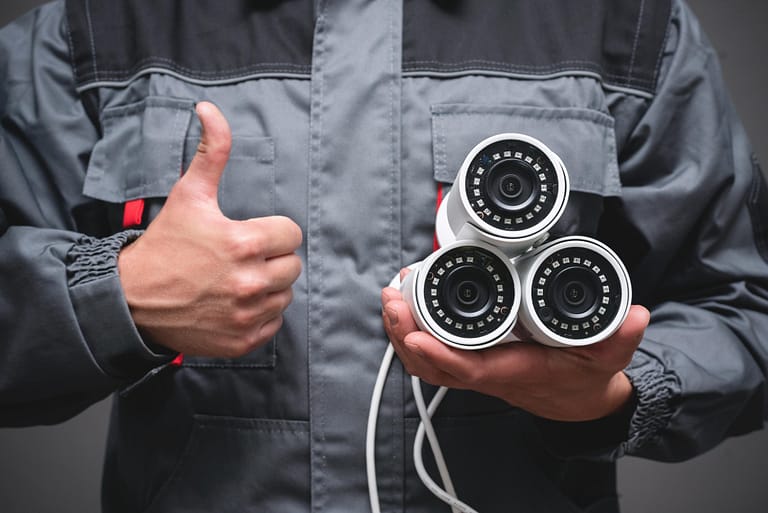Home Security Legal Guidelines in Dallas
When it comes to home security in Dallas, it's important to ensure that your security measures comply with legal guidelines. For example, Texas law prohibits intrusive visual recording without consent.
While it's generally acceptable for neighbors to have cameras pointed at your property, they should avoid recording areas where privacy is expected.
When installing security cameras, consider strategic placement, such as at exterior front doors and common areas. It's also advisable to inform tenants about operational cameras, preferably in the lease.
Understanding these legal guidelines and seeking professional advice can help you maintain both security and compliance.
Key Takeaways
When dealing with home security in Dallas, it's crucial to ensure that your security measures comply with legal guidelines. For instance, Texas law prohibits recording someone visually without their permission.
While it's generally okay for neighbors to have cameras aimed at your property, they should avoid recording areas where privacy is expected.
When you're setting up security cameras, think about where to place them strategically, such as at exterior front doors and common areas. It's also a good idea to let tenants know about operational cameras, preferably in the lease.
Understanding these legal guidelines and seeking professional advice can help you maintain both security and compliance.
Legal Regulations for Home Security in Dallas
It's important to comply with the legal regulations for home security in Dallas to protect your property and privacy.
In Dallas, the laws regarding home security cameras are specific. Texas is a One-Party Consent State, meaning that at least one person involved in the recorded communication must consent to the recording. This rule applies to both video and audio recordings.
Additionally, the use of security cameras must adhere to state laws, and it's crucial to ensure that the cameras aren't invading the privacy of others. Visible cameras are allowed, but concealed cameras are illegal.
Understanding and following these laws not only keeps you compliant but also helps in respecting the privacy of those around you.
Moving on to the next section, let's explore the surveillance camera laws in Dallas.
Surveillance Camera Laws in Dallas
When installing surveillance cameras in Dallas, it's crucial to comply with local laws and regulations. You need to consider the expectation of privacy and specific laws regarding audio recordings.
For instance, Texas Penal Code 43.26 prohibits invasive visual recording and the capture of images or videos of someone's intimate regions. Texas is a One-Party Consent State, meaning at least one person involved in the recorded communication must consent.
To ensure compliance and protect individuals' rights, consider consulting with security consultants.
It's also important to note that concealed cameras are unlawful, and it's advisable to inform individuals about operational cameras, especially in rental agreements or leases.
Privacy Rights and Home Security in Dallas
When it comes to privacy rights and home security in Dallas, it's crucial to follow the laws and regulations concerning video and audio recordings, especially regarding privacy expectations and consent.
In Dallas, like the rest of Texas, understanding the state privacy laws and complying with them when using video surveillance for home security is essential.
Whether it's for a smart home setup or traditional security systems, it's vital to work with a trusted security integrator who knows the legal aspects of video surveillance.
Additionally, maintaining security awareness among household members is important to respect privacy and avoid accidental breaches.
It's also essential to be mindful of public spaces and ensure that any surveillance measures are lawful to protect privacy rights while enhancing home security.
Home Security Camera Placement Rules in Dallas
When it comes to home security camera placement rules in Dallas, it's crucial to balance security and privacy. Here are some important guidelines to follow:
- Firstly, think about where you'll place the cameras to make sure they don't invade your neighbors' privacy.
- If you're renting or own a business, review your rental agreement and talk to your insurance provider about any specific requirements for installing security systems.
- It's essential to understand the laws in Texas regarding home security camera placement, including rules about video recording and privacy.
Audio Recording Laws in Dallas
When setting up a home security system in Dallas, it's important to consider the legal guidelines for audio recording. Texas follows one-party consent laws, meaning that at least one person involved in the communication must agree to the recording. Understanding these state laws is crucial to avoid legal complications.
The Division of the Texas Department of Public Safety and the Texas Private Security Bureau emphasize the serious consequences of capturing audio without consent. Therefore, it's essential to obtain consent and inform all parties involved when implementing audio recording as part of your home security measures.
Staying informed about video surveillance laws in Dallas is also advisable to ensure full compliance with legal requirements.
Business Security Compliance in Dallas
In Dallas, it's vital for businesses to comply with specific legal guidelines for security. These guidelines are governed by Texas state laws and regulations.
Business owners need to consider laws about audio recordings, such as Texas Penal Code 43.26, which prohibits invasive visual recording when choosing video surveillance technologies.
It's also important for businesses to seek professional security solutions to protect against employee theft and ensure that security camera installations comply with relevant laws and regulations.
Understanding and implementing measures outlined in Texas Penal Code Section 16.02, which governs the unlawful use, interception, or disclosure of communication in surveillance, is crucial. This helps businesses safeguard their operations while respecting the legal rights of individuals.
Frequently Asked Questions
Can My Neighbor Legally Point a Security Camera at My Property in Texas?
Yes, in Texas, your neighbor is allowed to aim a security camera at your property, as long as it doesn't violate your privacy rights. However, it's important to consider neighbor disputes, property boundaries, and legal implications. Consent is required under surveillance laws, and trespassing concerns should be addressed. It's crucial to understand the laws and regulations to ensure your rights are protected.
What Is Considered Illegal Surveillance in Texas?
Curious about what's not allowed when it comes to surveillance in Texas? Well, simply put, it's illegal to record audio in private settings without permission, hide cameras, or use drones for spying. These actions are prohibited to protect privacy and prevent unauthorized intrusion. For example, recording someone's conversation without their knowledge or consent is a violation of their privacy rights. Similarly, using hidden cameras to watch or monitor someone in private spaces is against the law. Additionally, flying drones to capture images or videos of individuals in places where they have a reasonable expectation of privacy is considered illegal surveillance. These regulations aim to safeguard personal privacy and maintain ethical standards in surveillance practices.
Do You Need Permission to Put up a Security Camera?
Yes, you must get permission before installing a security camera. This is important because it respects people's privacy and complies with consent and recording laws. It's also crucial to consider ethical surveillance practices, property boundaries, and the cooperation of the police and homeowner associations when setting up cameras.
Do You Need a License to Install Security Cameras in Texas?
In Texas, you must have a license to install security cameras. This license ensures that you comply with installation regulations, surveillance laws, and proper camera placement. It's important for protecting privacy rights and preventing unauthorized monitoring on both public and private property. Additionally, having a license signifies a commitment to professionalism and accountability in the security industry.







